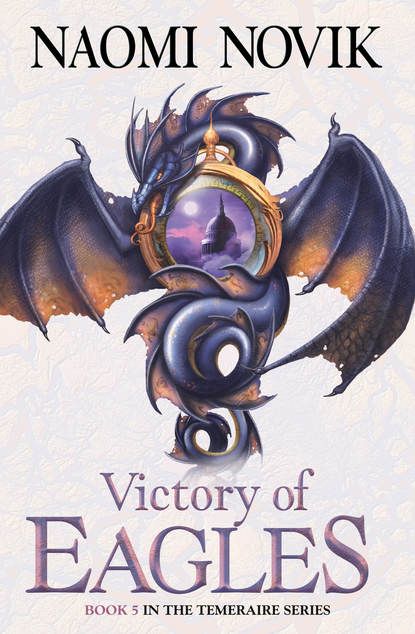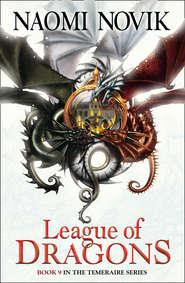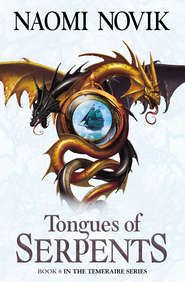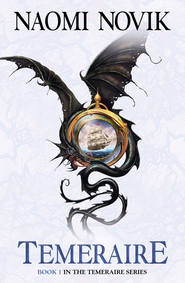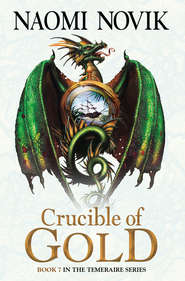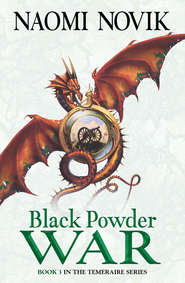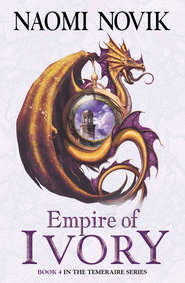По всем вопросам обращайтесь на: info@litportal.ru
(©) 2003-2024.
✖
Victory of Eagles
Автор
Год написания книги
2019
Настройки чтения
Размер шрифта
Высота строк
Поля
He had seen the same impulse have much the same result during other battles. The ball took off the better part of the young man's foot and continued unperturbed into and through the metal grating, skewing the door off its top hinge before finally embedding itself, two inches deep into the solid oak wall of the ship. Laurence pushed the swinging door open and climbed out of the brig, taking off his neckcloth to tie up the Marine's foot. The young man was staring mutely at his bloody stump, and needed a little coaxing to limp along to the orlop. ‘As clean a shot as I have ever seen,’ Laurence said, encouragingly, and left him there for the surgeons. The steady roar of cannon-fire was going on overhead.
He climbed the stern ladder-way and plunged into the roaring confusion of the gun-deck. Daylight shining through jagged gaping holes in the ship's east-pointed bows, made a glittering cloud of the smoke and dust kicked up from the cannon. Roaring Martha had jumped her tackling, and five men were fighting to hold her long enough against the roll of the ship to get her secure again. At any moment, the gun might go running wild across the deck, crushing men and perhaps smashing through the side. ‘There girl, hold fast, hold fast—’ The captain of the gun-crew spoke to the canon as if she were a skittish horse, his hands flinching away from the smoking-hot barrel. One side of his face was bristling with splinters standing out like hedgehog spines.
No one knew Laurence in the smoky red light, he was only another pair of hands. His flight gloves were still in his coat pocket. Wearing them, he clapped on to the metal and pushed her by the mouth of the barrel, his palms stinging even through the thick leather, and with a final thump she heaved over into the channel again. The men tied her down and stood around trembling like well-run horses, panting and sweating.
There was no return fire, no calls passed along from the quarterdeck, no ship in view through the gun port. The ship was griping furiously where he put his hand on the side, a sort of low moaning complaint as if she were trying to go too close to the wind. Water glubbed in a curious way against her sides, a sound wholly unfamiliar, and he knew this ship. He had served on Goliath four years in her midshipman's mess as a boy, as lieutenant for another two and at the Battle of the Nile; he would have said he could recognise every note of her voice.
He put his head out of the porthole and saw the enemy crossing their bows and turning to come about for another pass She was only a frigate: a beautiful trim thirty-six gun ship which could have thrown not half of Goliath's broadside; an absurd combat on the face of it, and he could not understand why they had not turned to rake her across the stern. There was only a little grumbling from the bow-chasers above, not much of a reply to be making, though there was a great deal shouting.
Looking forward along the ship, he saw that she had been pierced by an enormous harpoon through her side, as if she was a whale. The end inside the ship had several curved barbs, which had been jerked back to bite into the wood. And when Laurence put his head out of the port-hole, he caught sight of the cable at the harpoon's other end swinging grandly up and up, into the air, where two enormous heavyweight dragons were holding on to it: a Grand Chevalier, and a Parnassian, middle-aged, likely traded to France during an earlier peacetime, and a Grand Chevalier.
It was not the only harpoon: three more cable-lines dangled from their grip to the bow, and Laurence could see another two stretched from the stern. The dragons were too far aloft for him to note all of the details, with the ship's motion underneath him, but the cables were somehow laced into their harnesses. By flying together and pulling, they were pivoting the ship's head into the wind. The dragons were too far aloft for round-shot to reach them. One of them sneezed, from the action of the frantic pepper guns, but they had only to beat their wings to get away from the pepper, hauling the ship merrily along while they did it.
‘Axes, axes,’ the lieutenant was shouting; then the clattering of iron as the bosun's mates came spilling weapons across the floor: hand-axes, cutlasses, knives. The men snatched them up and began to reach out of the portholes to hack at the ropes, but the harpoon shafts were two feet long, and the ropes had enough slackness to prevent good purchase. Someone would have to climb out of a porthole to saw at them: open and exposed against the hull of the ship, with the frigate coming around again.
No one moved at first; then Laurence reached out and took a short cutlass, from the heap. The lieutenant looked into his face, and knew him, but said nothing. Turning to the opening Laurence worked his shoulders out, hands quickly beneath his feet to support him, and eeled out as the lieutenant started calling again. Shortly, a rope was flung down to him from the deck above, so he could brace himself against the hull. Many faces peered over anxiously, all strangers; then another man came sliding down over the rail, and another, to work on the other harpoons.
Making a bright target against the ship's paintwork, Laurence began the grim effort of sawing away at the cable, strands fraying one at a time. The rope was cable-laid: three hawsers of three strands, well wormed and thick as a man's wrist, parcelled in canvas.
If he were killed, at least his family would be spared the embarrassment of his hanging. He was only alive now to be a chain round Temeraire's neck, until the Admiralty judged the dragon pacified enough by age and habit that Laurence might be dispensed. That could mean he faced years, long years, mouldering in gaol or in the bowels of a ship.
It was not a purposeful thought, no guilty intention; it only crossed his mind involuntarily, while he worked. He had his back to the ocean and could not see anything of the frigate or the larger battle beyond: his horizon was the splintered paint of Goliath's side, lacquered shine made rough by splinters and salt, and the cold sea was climbing up her hull and spraying his back. Distant roars of cannon-fire spoke, but Goliath had let her guns fall silent, saving her powder and shot for when they should be of some use. The loudest noises in his ears were the grunts and effort of the men hanging near-by, sawing at their own harpoon lines. Then one of them gave a startled yell and let go his rope, falling away into the churning ocean; a small darting courier-beast, a Chasseur-Vocifère, was plunging at the side of the ship with another harpoon.
The beast held it something like a jouster in a medieval tournament, with the butt rigged awkwardly into a cup attached to its harness, for support, and two men on its back bracing the rig. The harpoon thumped dully against the ship's side, near to where Laurence hung, and the dragon's tail slapped a wash of salt water up into his face, heavy stinging thickness in his nostrils and dripping down the back of his throat as he choked it out. The dragon lunged away again even as the Marines fired off a furious volley, trailing the harpoon on its line behind it: the barb had not bitten deep enough to penetrate. The hull was pockmarked with the dents of earlier attempts, a good dozen for each planted harpoon marring her spit-and-polish paintwork.
Laurence wiped salt from his face against his arm and shouted, ‘Keep working, man, damn you,’ at the other seaman still hanging near him. The first strand was going, tough fibres fraying away from the cutlass edge and fanning out like a broom. He began on the second, rapidly, although the blade was going dull.
The roar of the cannon made him jerk, involuntarily, and the ball came whistling across the water, skipping two, three times along the wave-tops, like a stone thrown by a boy. It looked as though it came straight for him, an illusion. The whole ship groaned as the ball punched at the bows, and splinters flew like a sudden blizzard out of the open portholes. They peppered Laurence's legs, stinging like a flock of bees, and his stockings were quickly wet with blood. He clung on to the harpoon arm and kept sawing; the frigate was still firing, her broadside rolling on, and the roundshot hurtled at them again and again. There was a sickening deep sway to Goliath's motion now as she took the pounding.
He had to hand the cutlass back and shout for a fresh one to get through the last strand. Then at last the cable was cut loose and swinging away free, and they pulled him back in. He staggered when he tried to stand, and went to his knees slipping in blood: stockings laddered and soaked through red; his best breeches, the ones he had worn for the trial, were pierced and spotted. He was helped to sit against the wall, and turned the cutlass on his own shirt, for bandages to tie up the worst of the gashes; no-one could be spared to help him to the surgeons. The other harpoons had been cut and they were moving at last, coming around. All the crews were fixed by their guns, savage in the dim red glow, teeth bared and mazed with blood from cracked lips and gums, their faces black with sweat and grime, ready to take vengeance.
Suddenly, a loud pattering like rain or hailstones came down: small bombs with short fuses dropped by the French dragons. Lightning flashes were visible through the boards of the deck. Some rolled down through the ladderways and burst in the gun-deck, hot flash-powder smoke and the burning glare of pyrotechnics, painful to the eyes. Then the cannon were speaking as they hove around in view of the frigate, and the order came down to fire.
There was nothing for a long moment but the mindless fury of the ship's guns going: impossible to think in that roaring din, smoke and hellish fire in her bowels choking away all reason. Laurence reached up for the port-hole when they had paused, and hauled himself up to look. The French frigate was reeling away under the pounding, her foremast down and hulled below the water-line, so each wave slapping away poured into her.
There was no cheering. Past the retreating frigate, the breadth of the Channel spread open before them. All the great ships of the blockade were as entangled and harassed as they had been. Bucephalas and the mighty Gloucester, both 100 guns, were near enough to recognize. They wore cables rising up to three and four dragons; a flock of French heavyweights and middleweights industriously tugging them every which way. The ships were firing steadily but uselessly, clouds of smoke that did not reach the dragons above.
And between them, half a dozen French ships-of-the-line, come out of harbour at last, were stately going by, escort to an enormous flotilla. A hundred and more, barges and fishing boats and even rafts in lateen rig, all of them crammed with soldiers, the wind at their backs and the tide carrying them towards the shore, tricolours streaming proudly from their bows towards England.
With the Navy paralysed, only the dragons of the Corps were left to stop the advance. But the French warships were firing something like pepper into the air above the flotilla, in quantities that could never have been afforded if it were. It burned. Red spark fragments glowed like fireflies against the black smoke-cloud hanging over the boats, shielding them from aerial attack. One of the transport boats was near enough that Laurence saw the men had their faces covered with wet kerchiefs and rags, or huddled under oilcloth sheets. The British dragons made desperate attempts to dive, but recoiled from the clouds, and had instead to fling down bombs from too great a height: ten splashing into the wide ocean for every one which came near enough to make a wave against a ship's hull. The smaller French dragons harried them too, flying back and forth and jeering in shrill voices. There were so many of them, Laurence had never seen so many: wheeling almost like birds, clustering and breaking apart, offering no easy target to the British dragons in their stately formations.
One great Regal Copper, who might have been Maximus: red and orange and yellow against the blue sky, flew at the head of a formation with Yellow Reapers in lines to each wing, but Laurence did not see Lily. The Regal roared, audible faintly even over the distance, and bulled his formation through a dozen French lightweights to come at a great French warship: flames bloomed from her sails as the bombs at last hit, but when the formation rose away again, one of the Reapers was streaming crimson from its belly and another was listing. A handful of British frigates, too, were valiantly trying to dash past the French ships to come at the transports: with some little success, but they were under heavy fire, and if they sank a dozen boats, half the men were pulled aboard others, so close were the little transports to one another.
‘Every man to his gun,’ the lieutenant said sharply. Goliath was turning to go after the transports. She would be passing between Majestueux and Héros, a broadside of nearly three tons between them. Laurence felt it when her sails caught the wind properly again: the ship leaping forward like an eager racehorse held too long. She had made all sail. He touched his leg: the blood had stopped flowing, he thought. He limped back to an empty place at a gun.
Outside, the first transports were already hurtling onward to the shore, lightweight dragons wheeled above to shield them while they ran artillery onto the ground. One soldier rammed the standard into the dirt, the golden eagle atop catching fire with the sunlight: Napoleon had landed in England at last.
Chapter Two (#ufc6c6828-520a-5394-bfaf-98803e721660)
The question sent out, Temeraire found the prospect of an answer almost worse. Before, the world itself had been undecided. If Laurence was still in it he might as easily stay alive as not, and so long as Temeraire continued to believe, Laurence was alive, at least in part. At best, the news would report that he was still imprisoned. As the day crept onward, Temeraire began to feel that certainty was a weak reward for the risk of receiving an answer to the contrary, a possibility Temeraire could not bear to envision. A great blankness engulfed him if he tried, like a grey sky full of clouds above and below, fog all around.
He wanted distraction badly, and there was none, except to talk to Perscitia, who was at least interesting, if infuriating also. Perscitia liked to think herself a great genius, and she was certainly unusually clever, even if she could not quite grasp the notion of writing. Occasionally, to Temeraire's discomfiture, she would leap quite far ahead, and come out with some strange notion, from none of the books Temeraire had read, that could neither be disproved, nor quarrelled with.
But she was so jealous of her discoveries that she flew into a temper when Temeraire informed her that any of them had been made before, and she was resentful of the hierarchy of the breeding grounds, which denied her the just desserts of her brilliance. Because of her middling size, she had to make do with an inconvenient poky clearing down in the moorlands, about which she complained endlessly. It provided little more than an overhang to shelter from the rain.
‘So why do you not take a better place?’ Temeraire said, exasperated. ‘There are several very nice ones directly over there, in the cliff face; you would be much more comfortable there, I am sure.’
‘One does not like to be quarrelsome’ Perscitia said being evasive and entirely false: she liked very well to be quarrelsome, and Temeraire did not understand what that had to do with taking an empty cave, either, but at least it diverted the subject.
The only event of note was that it rained for a week without stopping, with a steady driving wind that came in to all the cave-mouths and permeated the ground, and made everyone perfectly miserable. Temeraire was very glad of his antechamber, where he could shake off the water and dry before retreating to the comfort of his larger chamber. Several of the smallest dragons, courier-weights living in the hollows by the river, were flooded out of their homes entirely. Feeling sorry for their muddy and bedraggled state, Temeraire invited them to stop in his cavern, while the rain continued, so long as they first washed off the mud. They were, at least, loud with appreciation for his arrangements.
A few days later, when he was once again solitary and brooding over Laurence, a shadow crossed over the mouth of his cave. It was the big Regal Copper, Requiescat; he ducked in through the antechamber and came into Temeraire's main chamber, uninvited. He gazed around the room with an impressed air, and nodding said, ‘It is just as nice as they said.’
‘Thank you,’ Temeraire said, thawed a little by the compliment. He did not feel much like company, but remembered he must be polite. ‘Will you sit down? I am sorry I cannot offer you tea.’
‘Tea?’ Requiescat said absently. He was busy poking his nose into the corners of the cave, even putting his tongue out to smell them, as if he were at home; Temeraire's ruff began to bristle.
‘I beg your pardon,’ he said, stiffly, ‘I am afraid you have found me unprepared for guests,’ which he thought was a clever way of hinting that Requiescat might go away again.
But the Regal Copper did not take the hint; or at any rate he did not choose to go. but instead settled himself comfortably along the back of the cave and said, ‘Well, old fellow, I am afraid we will have to swap.’
‘Swap?’ Temeraire said, puzzled, until he divined that Requiescat meant caves. ‘I do not want your cave,’ adding hastily, ‘I am sure that it is very nice, but I have just got this one arranged to suit me.’
‘This one is much bigger now,’ Requiescat explained, ‘and it is much nicer in the wet. Mine,’ he added regretfully, ‘has been full of puddles all week; wet clear through to the back.’
‘Then I can hardly see why I would change,’ Temeraire said, still more baffled, and then he sat up, outraged and astonished, and let his ruff spread fully. ‘Why, you are a damned scrub,’ he said. ‘How dare you come here, and behave like a visitor, when all the time it is a challenge? I have never seen anything so devious in my life; it is the sort of thing Lien would do,’ he added, cuttingly. ‘You may get out at once. If you want my cave you may try to take it. I will meet you anytime you like: now, or at dawn tomorrow.’
‘Now, now, let us not get excited,’ Requiescat said soothingly. ‘I can see you are a young fellow, right enough. A challenge, really! It is nothing of the sort; I am the most peaceable fellow in the world, and I do not want to fight anyone. I am sorry if I was ham-handed about it. It is not that I want to take your cave, you see—’ Temeraire did not see, in the least, ‘—it is a question of appearances. Here you are a month, with the nicest cave, and you nowhere near the biggest either.’ Requiescat preened his own side, a little. He certainly outweighed any dragon Temeraire had seen, except Maximus and Laetificat. ‘We have our own little ways here, of arranging things to keep everyone comfortable. No one wants any fighting to cut up our peace, not when there is no need. It would be a nasty-tempered sort of fellow who would get to fighting over one cave versus another, both of them large and handsome; but distinctions must be preserved.’
‘Stuff,’ Temeraire said. ‘It sounds to me like you have become so lazy, having all your meals given to you and nothing to do, that you do not even want to put yourself to the trouble of properly bullying other people. Or maybe,’ he added, having made up his mind to be really insulting, ‘you are just a coward, and thought I was the same. Well, I am not, and I am not going to give you my cave, either, no matter what you do.’
Requiescat did not rise to the remarks, but only shook his head dolefully. ‘There, I am not a clever chap, so I have made a mull of explaining, and now your back is put up. I suppose we will have to get the council together, or you will never believe me. It is a bother, but it is your right, after all.’ He heaved himself back to his feet and added, infuriatingly, ‘You may keep the place until then; it will take me a day or so to get word to everyone,’ before he padded out again, leaving Temeraire quivering with rage.
‘His cave is the nicest,’ Perscitia said anxiously, later, ‘at least, we have certainly always thought so. I am sure you would like it, and maybe you could make it even more pleasant than this? Why don't you go and see it before quarrelling?’
‘I do not care if it is Ali Baba's cave, and full of gold and lamps,’ Temeraire said, not even trying to master his temper. It felt better to be angry than miserable, and he was glad of having something else to think about instead of that which he could do nothing to repair. ‘It is a question of principle. I am not going to be bullied, as though I were not up to fighting him. If I made the other cave nice, he would only try and take it back, I am sure. Or some other dragon would try and push me out. Who are this council?’
‘It is all the biggest dragons,’ Perscitia said, ‘and a Longwing, although Gentius does not bother to come out much anymore.’
‘All of them his friends, I suppose,’ Temeraire said.
‘Oh no; no one much likes Requiescat.’ Moncey said, perched on the lip of Temeraire's cave. ‘He eats so much, and will never take less, even if it's short commons all around. But he is the biggest, and there should not be fighting, so the general rule is that caves go by who is strongest if there is any quarrel. No one is allowed to take a place out of his class, or others will get jealous and squabble.’
‘You see, it is just as I told you: all unfairness,’ Perscitia said bitterly, ‘as if the only quality of any importance were one's weight, or how good one is at scratching and biting and kicking up a fuss; never any consideration for really remarkable qualities.’
‘I grant it has some practical sense as a way to choose caves,’ Temeraire said, ‘but it is nonsense that after I have taken one— One that he might have had at any time before I came, and did not want —he should be able to snatch it from me after I have gone to so much trouble to make it nice. And he is not stronger than me, either, if he does weigh more. I should like to know if he has sunk a frigate, alone, with a Fleur-de-Nuit on his back? And as for distinction, my ancestors were scholars in China while his were starving in pits.’
‘Be that as it may, he knows all the council, and you don't,’ Moncey said, practically. ‘You are hardly going to fight a dozen heavyweights at once, and beg pardon, but no one looking at you would say, “right-o, there is a match for old Requiescat.” Not that you are little, but you are a bit skinny-looking.’





